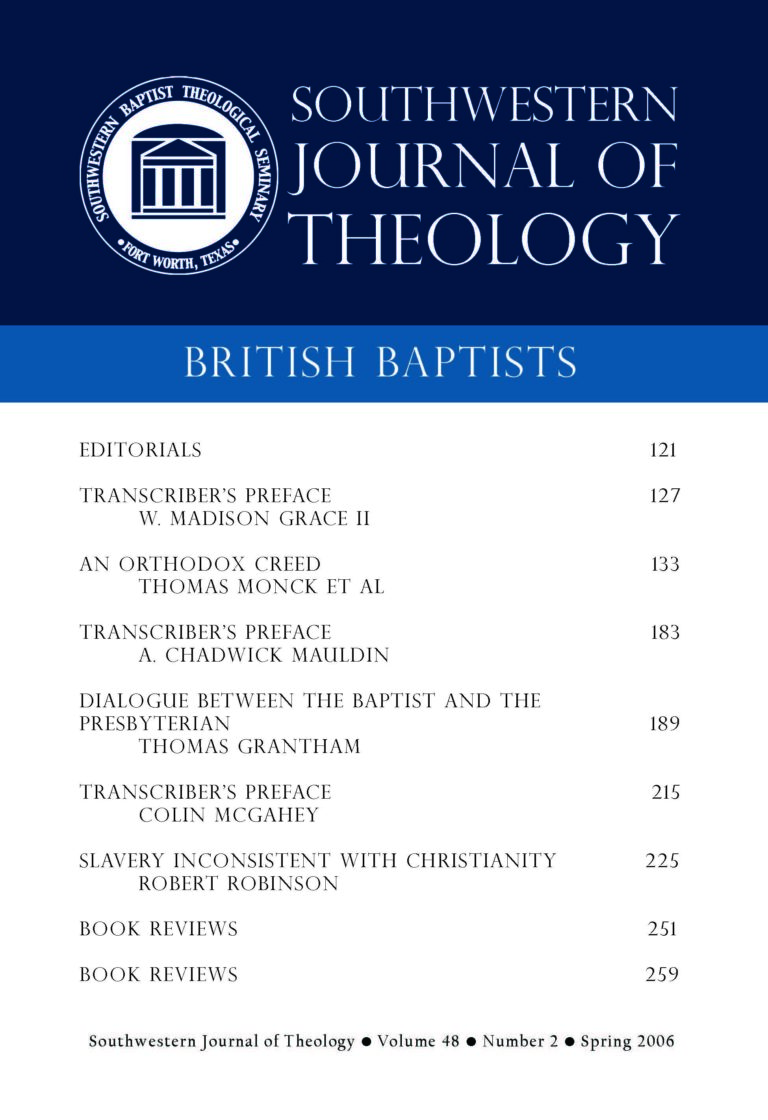
British Baptists
Southwestern Journal of Theology
Volume 48, No. 2 – Spring 2006
Managing Editor: Malcolm B. Yarnell III
Edited by Michael A. G. Haykin & Steve Weaver. Profiles in Reformed Spirituality. Grand Rapids: Reformation Heritage Books, 2007. 140 pages. Softcover. $10.00.
This is the third volume in the Profiles in Reformed Spirituality series edited by Joel Beeke and Michael A.G. Haykin published by Reformation Heritage Books. The book itself is ingeniously constructed so as to allow for use as a devotional, being of small size and composed of attractive, durable and high-quality materiel. The editors of this particular volume in the series are Haykin, a superb Baptist historian that the Southern Baptist Theological Seminary in Kentucky recently and wisely added to their fac- ulty, and Steve Weaver, a Tennessee Baptist pastor and research student of Haykin. Haykin wrote the introduction and Weaver led in the compilation of selected readings from the writings of Hercules Collins.
Hercules Collins was a leading Particular Baptist pastor in London, who was born (ca. 1646), born again, and died naturally (1702) during a formative period of British Baptist life. Collins was the author of some thirteen books and was the fifth signatory upon the confession adopted by a meeting of Particular Baptists in 1689 (A ConfessionofFaith, 3rd ed. [London, 1699], flyleaf; a.k.a. “The Second London Confession”). Col- lins lived out a faith that was hard-pressed to survive, suffering a horrific imprisonment in the diseased Newgate Prison, where at least three of his fellow Baptist pastors died. Collins himself remarked that his compatriots for Christ had been “hurried off to prison for nothing else but worship- ping their God” (15). Deprived of formal education through the system of persecution and “toleration” established by the British government, Collins nevertheless persisted in his intellectual development. Moreover, his ministry of books and proclamation ended successfully with a congregation of some 700 people, in spite of the handicaps he had suffered. Collins is an inspiring and laudable figure whose pious thoughts and example are ably introduced by Haykin.
The bulk of the text is comprised of 36 selected readings from the works of Collins and from a funeral sermon preached by John Piggott. Included are selections from a catechism he authored, based largely upon the Heidelberg Catechism (An Orthodox Catechism); stirring testimonies while suffering persecution, drawn from his A Voice from Prison and Counsel for the Living; discourses upon divine sovereignty and human responsibility (Mountains of Brass); thoughts upon Scripture and worship (The Scribe Instructed and An OrthodoxCatechism); helpful instructions regard- ing the calling, ordination, and work of a pastor and preacher (The Temple Repair’d); private devotional considerations from various works; and, a portion of the funeral sermon discussing Collins’s own faithful witness. As Piggott said, “He began to be religious early, and continued faithful to the last” (129). The readings are carefully chosen both for the typical Christian but especially the aspiring minister. They truly are inspiring (if technically not inspired) because the author imbibed and lived Scripture, and the editors are to be commended for their careful reading of Collins and spiritual concern for the modern reader.
While this little jewel has laudable strengths, it suffers from one glaring lacuna: the omission of the profound and deep baptismal piety of this convinced Baptist. This is extremely odd in light of the fact that Col- lins himself wrote four of his thirteen books in order to defend the practice of believers-only baptism by immersion! Moreover, this is something of which the editors are fully aware (135–36). Perhaps at least one citation from one of these four books would have shown how Collins considered baptism properly administered and received to be part of true Christian piety. For instance, in Believers-Baptism from heaven, and of Divine Institution. Infants-Baptism from Earth, and Human Invention(London, 1691), Collins writes: “Believers are baptized as an Act of their Judgment, Choice, Will and Affection; so worship God in Spirit and Truth, John 4.24.” He follows this devotional affirmation with a disclaimer that paedo-baptists can truly act in this godly way: “Infants cannot worship God in that Act, in Spirit and Truth, because not an Act of Judgment and Choice, Will and Affection” (Collins’s italics; Believers-Baptism, 86).
Perhaps the reason that the book editors, both convinced Baptists, excluded the references to baptism was because this book is published by a thoroughly Reformed agency. The uncritical bias towards a Reformed outlook is also evident in the introduction, where non-Reformed Puritans, such as the vigorous General Baptists, are summarily dismissed in order to stress Calvinistic orthodoxy; the Second London Confession is described as “that most important of all Baptist confessional documents”; and, Re- formed doctors are given sole credit for the doctrine of aseity (3, 8, 23). In spite of such imbalances, this book is worthy of purchase and reading. We also look forward to the promised publication of Weaver’s critical edition of Collins’s last and perhaps most significant work, The Temple Repair’d.





